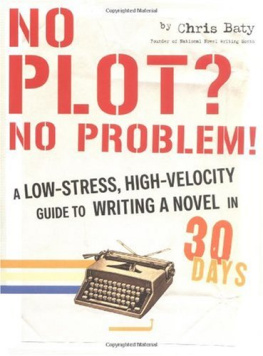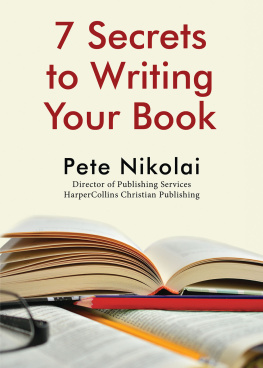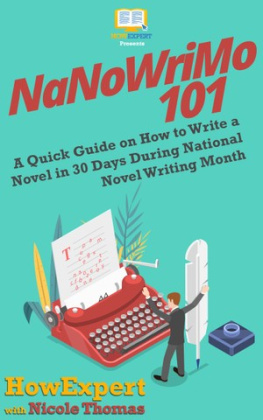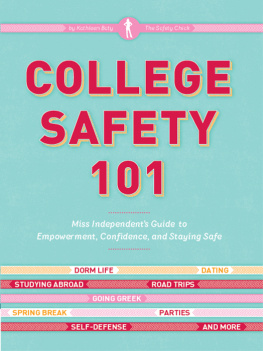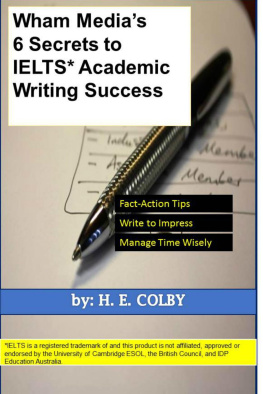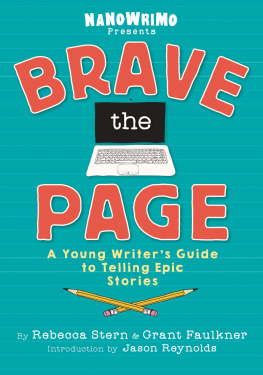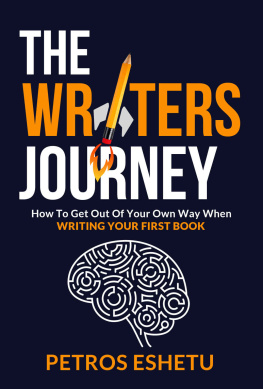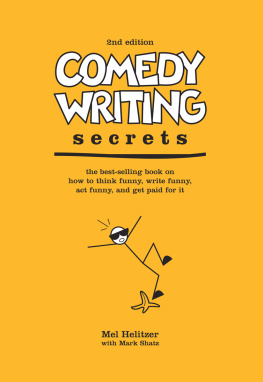NO PLOT? NO PROBLEM!
A Low-Stress, High-Velocity Guide to Writing a Novel in 30 Days
Chris Baty
FOR MY PARENTS, who knew it was possible all along.
----November is National Novel Writing Month (NaNoWriMo):
http://www.nanowrimo.org
The best way to read this book on DailyLit is to time your reading so that on November 1the first day of NaNoWriMoyou will receive installment 32. For the second half of the book, which is designed to offer day-by-day encouragement, you should read one installment per day each day of the week. Voil! Instant NaNoWriMo coach. Good luck!
----INTRODUCTION
The era, in retrospect, was very kind to dumb ideas.
The year was 1999, and I was working as a writer in the San Francisco Bay Area, drinking way too much coffee and watching the dot-com boom rewrite the rules of life around me. Back then, it seemed entirely feasiblenay, inevitablethat my friends and I would spend three tiring years in the workforce, throwing nerf balls at each other and staging madcap office-chair races. And then wed cash in our hard-earned stock options, buy a small island somewhere, and helicopter off into blissful retirement.
It was a delicious, surreal moment, and in the middle of it all I decided that what I really needed to do was write a novel in a month. Not because I had a great idea for a book. On the contrary, I had no ideas for a book.
All of this made perfect sense in 1999.
In a more grounded age, my novel-in-a-month concept would have been reality-checked right out of existence. Instead, the very first National Novel Writing Month set sail two weeks later, with almost everyone I knew in the Bay Area on board.
That the twenty-one of us who signed up for the escapade were undertalented goofballs who had no business flailing around at the serious endeavor of novel writing was pretty clear. We hadnt taken any creative writing courses in college, or read any how-to books on story or craft. And our combined postelementary-school fiction output would have fit comfortably on a Post-it Note. My only explanation for our cheeky ambition is this: Being surrounded by pet-supply e-tailers worth more than IBM has a way of getting your sense of whats possible all out of whack. The old millennium was dying; a better one was on its way. We were in our mid-twenties, and we had no idea what we were doing. But we knew we loved books. And so we set out to write them.
BOOKISH HOOLIGANS
That love of books, I think, was the saving grace of the whole enterprise. However unseriously we had agreed to take the writing process, we had an absolute reverence for novels themselves, the papery bricks of goodness that, once pried apart, unleashed the most amazing visions in their owners. In books, wed found magical portals and steadfast companions, witnessed acts of true love and gaped at absolute evil. Books, as much as our friends and parents, had been our early educators, allowing us our first exciting glimpses into life beyond the gates of childhood.
If we loved books, we were equally awestruck by their creators. Novelists were clearly a different branch of Homo sapiens; an enlightened subspecies endowed with a monstrously overdeveloped understanding of the human condition and the supernatural ability to spell words properly. Novelists, we knew, had it made. They got fawned over in book-stores, and were forever being pestered for insights on their genius in newspapers and magazines. They had license to dress horribly, wear decades-out-of-date hairstyles, and have their shortcomings interpreted as charming quirks and idiosyncrasies rather than social dysfunctions.
Best of all, novel writing was for them a lifetime sport, one of the few branches of the entertainment industry where you are allowed to have a career long after youve stopped looking good in hot pants. In short, we adored novels and glorified writers, and thought that if, after a months labors, we could claim even the thinnest of alliances with that world, something mysterious and transformational would happen to us. The possibility of starting the month with nada and ending it with a book wed written
no matter how bad that book might bewas irresistible. And though we never admitted it to one another, there was also the hope that maybe, just maybe, wed yank an undeniable work of genius from the depths of our imagination. A masterpiece-in-the-rough that would forever change the literary landscape. The Accidental American Novel. Just think of the acclaim! The feelings of satisfaction! The vastly increased dating opportunities!
The power this last point held over us, sadly, is not to be underestimated. And as a music nerd, I knew it could happen. The annals of rock and roll are filled with self-taught musicians who recorded albums first and learned how to play an instrument much later. The Sex Pistols, the Ramones, Beat Happening
they were all inspirational examples of unpolished, untrained people who went from nobodies to kings and queens of their oeuvre through sheer exuberance.
If fantasies of screaming, headbanging fans forming mosh pits at our book signings were flitting through our minds in 1999, though, we werent admitting it to anyone. Officially, this whole monthlong novel-writing thing was to be an exercise in slapdash mediocrity. The more you wrote and the less you pretended to care, the better your standing in the field.
So at the dawn of the first National Novel Writing Month we laughed and toasted one anothers complete lack of preparation and dismal chances of success with gusto. Much like novice sailors making good on a drunken dare, we were sailing out to sea on an already-sinking ship. And that, on July 1, 1999, was how National Novel Writing Month began: Twenty-one of us waving merrily to well-wishers gathered on shore, blowing kisses at our friends and family as we secretly cast nervous glances around the deck for life rafts.
We had no idea at the time how soon wed end up needing them.
A MONTH AT SEA
Writer and championship figure skater Ralph Waldo Emerson once wrote, In skating over thin ice, our safety is in our speed. As we hurled ourselves toward our likely literary demise, we were nothing if not quick about it.
The opening week of NaNoWriMo (as we were all soon calling it) was an overcaffeinated typing frenzy. For the sake of clarity, we had all agreed to define a novel as 50,000 words of fiction. With that lofty goal in sight, quantity quickly took precedence over quality, and we met in coffeeshops after work each night to add another couple thousand words of girth to our literary creations. As we wrote, we gave ourselves word quotas and created elaborate challenges and races. Anyone who hadnt reached their writing goal wasnt allowed to get drink refills or go to the bathroom until they hit the mark. It was ridiculous, screaming fun, and the levity of those early sessions infused what would have normally been a terrifying endeavorwriting a book in an absurdly short amount of timeinto a raucous field trip to novel-land.
The rambunctious mood of those first few days was further buoyed by the fact that the writing campaign started off well for all of us. In short order, we had settings, main characters, and a few chapters under our belts. The hardest part was over, it seemed, and we settled into our novels with the happy assurance that our muses would ably guide us through whatever unfamiliar terrain lay ahead. Our muses, it turned out, had other plans.
BECALMED
By the seven-day mark, the initial excitement had worn off, and it revealed a sad and ugly truth: Our novels were bad. Maybe even horrible. As Week One slipped away, the intoxicating speed of the escapade ground to a halt, and we began poking at our novels with the dismay of a third-grader whose heaping portion of dessert has been swapped for a plate of mushy vegetables. When we broached the subject of our flagging motivations during one of our writing sessions, it became clear that most of us were having the same problem: Starting had been easy. Continuing was hard. Perhaps flinging a random assortment of characters at a Microsoft Word document, we admitted, was not the soundest approach to book-building. And maybe trying to cram something as large as novel writing into an already busy schedule doomed both life and literature. Our lives certainly had taken on the feel of cursed things: Giving over every free moment to ones novel meant no sleeping-in on weekends, no matinee movies, and no languorous dinners with friends. Instead, we spent our downtime prodding at lifeless characters and wondering how long a human body could subsist on an all-ramen and Coke diet before liver functions ceased entirely. By the middle of Week Two, we were ready to mutiny. Half of the participants dropped out. Unfortunately, some of us had bragged so widely about our heroic novel-writing quest that we were too ashamed to quit before the month ended. So we slogged on, continuing to meet for less-than-joyous writing sessions. We were no longer in it to win it; our plan at that point was just to run out the clock. Week Two came and went. And then some strange things started happening. The aimless, anemic characters wed invented in the first fourteen days began to perk up and do things. Quirky, unexpected, readable things. They sold their SUVs and started commuting to work in golf carts. They joined polka bands and got kidnapped by woodland creatures and found themselves organizing jewel-heist capers with their next-door neighbors from the nursing home. It was as if our main characters, tired of waiting for competent stage direction from us, simply took control of the show. Thankfully, they turned out to be far better storytellers than we ever were. The listlessness of Week Two lifted, and the flat lines of our novels began to resemble the trajectories of honest-to-God story arcs. We were still tired, sure. But our books had gone from being albatrosses around our necks to welcoming ports in the storm of everyday life. Rather than dreading the nightly drudgery of writing, we began fantasizing about what directions the story would take in the course of the evenings work. We called our answering machines to dictate plot breakthroughs wed hatched on our morning commutes, and scribbled out ever-lengthening backstories on napkins, receipts, coworkers; anything we could get our hands on to capture some of the ideas that were pouring out of our overtaxed brains.
Next page
